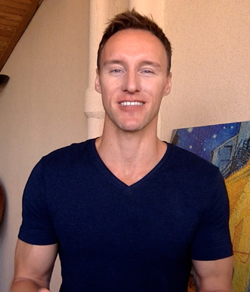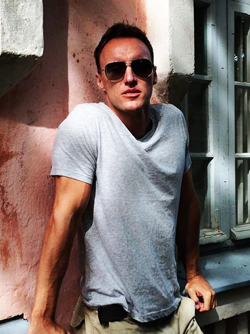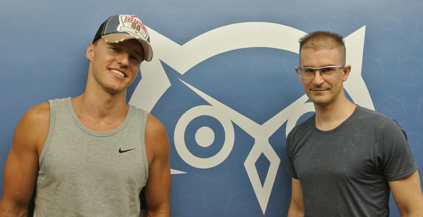The majority of people want to learn a foreign language well and perhaps dream of becoming a polyglot. The methods I'm going to share with you today will help you put focus onto your daily habits to make that become a reality from someone who lives that dream.
Who is Vladimir
Today I introduce you to Vladimir Skultety. Slovak by birth (that's a little country in eastern Europe), and a globetrotter by age 20, we met for the first time in 2009 in Dànshuǐ on the north coast of Taiwan (a Chinese-speaking island off the coast of China). From the very first encounter, the way his energy and smile and confidence radiated out convinced me that I had met someone completely unlike anybody I'd ever met before.

The more time I spent with him, the more I was convinced that I had met a true modern day polymath, someone who had achieved mastery in many areas of life. These are what Howard Gardner refers to as multiple intelligences, specifically interpersonal, intrapersonal, linguistic, kinæsthetic, and musical in Vladimir's case. He reached out to me since I had a polyglot presence on YouTube, but I quickly found that I desired to learn even more from him.
The first time I worked out at the gym with him, he said when you finish a set, push for five more reps. Awesome advice.
From the first day we met up to the day before he left Taiwan, he's maintained what most of us would call a perfect body, and despite the eclectic mix of the world's greatest cuisines to be experienced in Taiwan, Vladimir didn't lose his perfect set of abs the whole time I knew him. He also competed and placed in triathlons multiple times. Everything he sets his heart to, he achieves to a level of success that many people could only dream of.
Most of that is due to his state of mind and always pushing out of the comfort zone. I invite you to enter the mind of an amazing individual. In this interview I asked him a number of questions about sleep, diet, workout, music and language. Before we get into the polyglot aspect of the interview, here's a quick list related to his routine and other interests.
Push yourself out of your comfort zone.

(2013宜蘭梅花湖全國運動會暨全國鐵人三項錦標賽)
- Hours of sleep: 8
- Morning routine: get up at 6 am, drink water, full body warm-up routine (mostly gymnastics) followed by lower back routine and breakfast.
- Diet: tending towards vegan now with 5-6 meals per day. Breakfast of oats, berries, chia, non-dairy milk. Regular supplements of vegan pea protein.
- Triathlons: participated in five sprint distance triathlons, and keeping his 5k run under 20 minutes.
- Workout: daily gym, intensive run/bike/swim for 10 days in a row followed by one day of rest.
- Languages: Slovak, Hungarian, Czech, English, German, French, Italian, Dutch, Spanish, Russian, Mandarin Chinese, Classical Chinese, Romanian, Portuguese, Polish, Persian, Japanese, Taiwanese, Serbian, Cantonese
- Music: 8 hours of practicing jazz-fusion/flamenco guitar for years, influences include Al Di Meola, Paco de Lucia, John McLaughlin
- Other Interests: Flight simulators, webdesign, ran an import business while in Taiwan, running the Forever a Student Blog, and Youtube Channel where you can watch many more videos of Vladimir sharing his learning tips. A Chinese Character YouTube Channel where Vladimir teaches you acquisition techniques of Chinese characters (and I, Michael Campbell, strongly recommended this channel!)
How do you maintain your languages?
VS: As you know there isn't much European language exposure in Taiwan. I was subscribed to podcasts for all the languages I knew and they were usually updated daily and I used to listen to them in every spare moment I had. If there wasn't enough time, I just focused on the languages I considered more important. I would also call and chat with friends every few days and occasionally read books in other languages.

What's your single most important language training exercise?
VS: Simultaneous interpretation back into my language. And if I can add one more, then I'd say listening to content that is one level above your comfort zone, especially content where a translation is available.
Simultaneous Interpretation: In this case, we refer not to the professional job skills, but rather an exercise you can do on your own. Specifically, translating everything you hear in a foreign language in your own language at the same time that you hear it. For example if I hear a Slovak say "Film bol úplne iný ako som očakával" I would interpret in my head immediately into English "The film was completely different from what I'd been expecting".
Let's go through your experience with each of your languages:
1 Slovak: Native, natural acquisition
2 Hungarian: Native, natural acquisition since kindergarten. Recently started doing simultaneous interpretation of news and radio talkshows or reading. (More about this technique below)
3 Czech: Native, natural acquisition. Czech is similar to Slovak, but I learned Czech through stories as a child, and I studied in Prague from 2007 to 2009.
4 English: Immersion. Between 8 and 18, I spent every summer in the USA. I didn't get the same high school or university experience as Americans, so my writing is not as good as my speaking, but I learned to speak as well as most Americans.
5 German: Natural acquisition with native speakers. I started watching hours of German TV when I was about 9. I formally started learning German when I was 12. We had German in school, but I had classes after school with a native speaker two days in a week and later spent several summers in Austria too. At that age, children learn very fast and one summer was really enough to first, transform the mostly passive knowledge of German I had into active language and second, give me confidence that I could speak German. Later I would go on to listen to news in German, interpret them simultaneously in to Slovak and read books in German.

Tip 1
Watched hours of German TV as a child.
Michael adds: This doesn't work the same for adults though. Useful to remember for when you have kids.
6 Italian: Self-study and immersion. I went to Italy as an exchange student when I was 22. I had a 10 hour crash course before I left, upon my arrival I bought a novel in Italian and started reading it with a dictionary trying to figure out the language on my own. I watched a lot of TV and talked to flatmates.
Tip 2:
Start by reading a novel.
Michael adds: This is one of my favorites, and I recommend starting with novels you've already read with lots of dialogue, so you know the story. If the language is in a different script, then you need a transcription in order to read fast enough to pick up on patterns.
7 French: Self-study. My grandmother's sister spoke French to me as a child, but after having learned Italian, French was easy to pick up through listening to news and reading books.
8 Dutch: Self-study. Based on my knowledge of German, I went through a coursebook, then read some books and listened to news in Dutch.
9 Spanish: Self-study. During one summer in New York I decided to learn Spanish. I made lots of word lists and compared them with the Italian that I knew. I practiced by simultaneously interpreting the Spanish that I heard into Slovak and speaking with friends.
10 Russian: Self-study/immersion. Russian is close to my native Slovak so I started listening to news from the first day. At first I had to pause the recording for almost every word, but by reviewing my list of words every day, I was able to understand 90% in just a few weeks. Then I started interpreting everything I heard. One great discovery I made here was single-person podcasts where people mostly speak in the first person which is great for learning how to express yourself. I spent a month in St. Petersburg and text-chatted a lot with friends after returning.
Tip 3:
I pause-rewinded the news and reached 90% comprehension in one month.
Michael adds: This works for closely related languages. See Toolset #2 below.
11-A Mandarin Chinese: Self-study/immersion. I tried a lot of approaches and failed at most of them. I started with an academic approach: pronunciation, tones, grammatical particles, and lots of characters, but it lead nowhere. Finding a language exchange partner in Prague helped a lot. I tried pause-rewinding intermediate-level Chinese language podcasts even when I was a beginner and this worked well as I could understand fairly well when I arrived in Taiwan. I stopped learning characters until after I had learned to speak well which was easier. Speaking with friends until I got comfortable interpreting TV shows or what others were saying was a lot easier than trying to attempt news.
Tip 4:
Don't translate what you want to say. Ask a native speaker how he would say it in that exact situation. Learn how they say it. The choice of words may be different but the idea is the same. This applies to most languages.
11-B Classical Chinese: Self-study. I read texts and analyzed grammar for a class in Prague. Later I wrote a character etymology dictionary which required reading thousands of pages of Classical Chinese.
12 Romanian: Self-study. I went through a basic Assimil course and went on to listening to news and reading books. Picking up the language was easily based on my knowledge of other Romance languages and surrounding Slavic languages.
13 Portuguese: Self-study. Most of this was based on my knowledge of Spanish. I went straight to listening to news in Portuguese, interpreting, and talking to Portuguese speaking friends.
14 Polish: Self-study. I used the same method as with Portuguese, this time acquiring the language through my knowledge of surrounding Slavic languages.
15 Persian: Self-study. I started learning while in Taiwan because I had an Iranian colleague at work. I didn't worry too much about grammar, but just asked him how to say things in Persian and starting to have conversations that way. Later I continued with online tutoring several times a week.
16 Japanese: Self-study. While in Taiwan I did a language exchange with a Japanese student who wanted to learn Chinese. At the end of each session, he recorded for me what we had discussed and I would listen to that over and over until the next session.
17 Taiwanese: Self-study. My studies weren't as serious with this as the others. I used a very similar technique with the Japanese.
18 Serbian: Self-study. After a conference I attended in Serbia, I bought a novel and started listening to news using the same technique I had used for Russian, and then continued through chatting with friends.
19 Cantonese: Self-study. I combined previous approaches in addition to Glossika's Cantonese spaced repetition audio. I found news programs in both Mandarin and Cantonese, so I'd listen to the Mandarin first for understanding, then switch to the Cantonese which made things easier.
Tip 5:
Comprehensible Input: both Glossika and bilingual Mandarin/Cantonese news programs get you to a high level of comprehension in little time.
And this is what you've been waiting for:
The Video Speaking 19 Languages
Okay, I know many of you may be skeptical. But here he is speaking all of them! With the exception of Hungarian, I understand most of it and can tell you that his accent and fluency is absolutely spot on. Not to mention his Taiwanese segment is hilarious and random.
Two Toolsets
One trend that I noticed throughout all of Vladimir's descriptions is that he always works with material that is a level above his own. For example, without knowing a word of many of his new languages, he jumps right in with news broadcasts and novels. It's as if beginner materials are a waste of time and beginner materials keep you at a beginner level. Whereas when he focuses on deciphering language at a more difficult level, he makes huge gains in his progress. And we can see this in many areas of his life and his accomplishments.
The second trend that I noticed is that he learns one language based on his knowledge of another language. So he has several core languages for each language group: Slovak, Italian, German, and Mandarin Chinese. All the other languages (except Hungarian and Persian) are variations based on those four: Dutch based on German; Czech, Polish, Russian, Serbian all based on his Slovak; Romanian, French, Spanish, Portuguese all based on his Italian; Cantonese, Taiwanese and Japanese (to a lesser extent) based on his Mandarin.

Conclusion
What all of this comes down to is your comfort zone: Vladimir is very good at determining what is outside of his comfort zone and how to adjust to a new level of comfort. And while fellow language learners keep practicing within and never leaving their comfort zones, Vladimir has already become comfortable at the next level which may be a level that few people reach, at which point Vladimir pushes himself out of that comfort zone again. So by the time a typical language learner does make it to intermediate, Vladimir has already mastered an advanced level of a language.
In our interview, Vladimir told me he's had enough language learning for now. Now that he can communicate with almost anybody in Europe and East Asia I'd say he deserves a rest from languages. But we can only expect to see his languages thrive and prosper since he's living and working in the heart of Europe.


